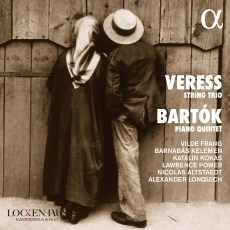Various - Veress: String Trio - Bartók: Piano Quintet - BBC Music Magazine
Hungarian composer Sándor Veress composed his String Trio during the early 1950s after he had already left his native country and was living in permanent exile in Switzerland. It’s a brilliant and challenging work, illustrating how effectively Veress managed to integrate serial techniques into his own distinctive musical idiom.
Although the melodic and harmonic elements are extremely chromatic, Veress’s soundworld remains strongly imbued with the spirit and character of Hungarian folk music. In this respect, its innovative string textures are not a million miles away from those that you might encounter in Bartók’s Third and Fourth Quartets.
In stark contrast, it’s far more difficult to detect putative Hungarian elements in Bartók’s early Piano Quintet from 1903. True, the forceful Finale has something of the spirit of a wild dance in the manner of a Liszt Hungarian Rhapsody, and the doom-laden thematic idea that opens the slow movement provides an intriguing anticipation of similar sonorities in his opera, Bluebeard’s Castle. But for the most part, the Quintet is a grandiose unashamedly late-romantic work brimming with gorgeous warm-hearted melodies and following very much in the footsteps of Dohnányi’s postbrahmsian idiom.
It’s difficult to understand why the Quintet has remained so neglected. Perhaps some blame can be attached to the composer who rejected the work, believing it not to be fully representative of his art. But whatever the case, it would be difficult to imagine a more compelling case for the musical merits of the Bartók and for that matter the Veress than these tremendously exciting performances featuring an all-star cast of virtuoso soloists.
